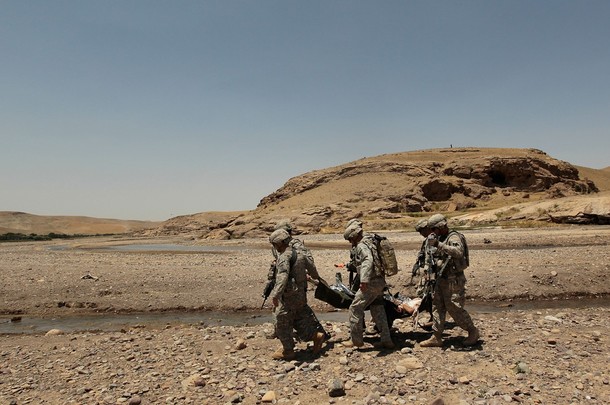
Whenever official Washington, be it the White House, the Pentagon, or the military, describe what is happening in Afghanistan, it is always discussed in terms of “progress.” This creates the mental construct that whatever is going on must be forward moving–we hardly ever think that progress can be negative. So, when things go well in Afghanistan (which is not very often), that is a sign of “real progress.” When things have so obviously not gone well–or as planned–to the degree that no one can say real progress with a straight face (which is much more often the case), then progress is described as something like “slow.” But it is always progress.
What if this entire frame of reference is simply wrong? Is it not possible that what we are doing is not only not making things better (better for whom, of course, being another question), but is actually making things worse for us or the Afghans? No one with official status is going to admit this possibility, because to do so suggests they have been doing a lousy job, either of planning a mission that had no reasonable prospect of success, of executing a strategy to fulfill the political objectives of the strategy, or both. The evidence, however, is not so clear that progress is the correct paradigm to deny the possibility that its opposite might not be more realistic.
The key concept to questioning the current paradigm is “blowback,” the idea that the actions one takes in effect creates negative consequences. The June 21, 2010 edition of Newsweek elaborates this concept in an article fittingly titled “Blowback” by Mark Hosenball and Evan Thomas. Part of the subtitle of the article is “how to battle Muslim extremists without creating more here at home.” The analysis suggests that it is possible to think of American efforts as creating more problems for the United States than it is solving–negative progress, in other words.
The whole idea of the American involvement (the political objective) is to refashion Afghanistan so that it will cease to be a source of terrorist action against the United States, and the military objective and strategy is to defeat the Taliban so that Afghanistan will no longer be a safe haven, training ground, or recruiting ground for terrorists who seek to penetrate and attack the United States. It has been the mantra of the entire effort that this is what we are doing and that this is both the intended and actual outcome of our effort.
But what if that analysis is simply wrong? What if the effect of U.S. efforts is a blowback that increases rather than decreases the number of terrorists bent on wreaking havoc on American soil? How could this happen? Blowback.
The Newsweek authors explain the basic idea. As they put it, “Any military action in a foreign country produces new incentives for the enemy.” In the case of American action in Afghanistan, the military action that has created animosities that have turned into the creation of new terrorists have been attacks against Afghan targets that have harmed Afghan civilians. The Newsweek article says, based on interviews with Afghan Jihadi sources that “the Taliban had no interest in attacking America directly–until the U.S. military started taking out their leaders (and sometimes their families).” They also quote an unnamed Taliban source, who says, “The Americans are attacking us in our country, our villages, and our houses, so why shouldn’t we attack them in their country?”
Pretty good question, and one that the U.S. military recognizes. General Stanley McChrystal has been emphatic about limiting so-called collateral damage–mainly civilian casualties–but mythology about precision weapons and the like notwithstanding, such events will always be part of war–Clausewitz’s “fog and friction.” It may be possible to limit the problem, but it is probably not possible to eliminate it altogether.
Killing people and destroying their things antagonizes people. We know that and have acted accordingly. The entire post-9/11 military effort by the United States in Iraq and Afghanistan is, after all, blowback for the 9/11 attacks by Al Qaeda. Why would we be surprised that some Afghans feel the same way about what we are doing in their country?
To deny that there is some blowback factor attached to the Afghan effort is ridiculous,and anyone who says there is not is either a liar or hopelessly naive. The real question is whether the efforts the United States is taking in Afghanistan is suppressing more potential and actual terrorism than it is creating. In other words, if the United States were not doing what it is doing, would the Afghan terrorist threat be greater or lesser than it is today? Put yet another way, is progress positive or negative, or is progress the right word to describe the impact of what we are spending an awful lot of money on to create?
I do not know the answer to the equation: the suppression/blowback ratio, but neither does anyone else. If the answer were overwhelming positive and demonstrable (two quite different propositions), I cannot believe that we would not be shouting it from the rooftops as evidence of “progress.” That we are not suggests either that we have not asked the question (possibly because we fear the real answer), or that we have and cannot fit the answer we have found into the progress model. Since the whole effort appears to be making little progress, it would be nice to know though, wouldn’t it?
Donald M. Snow, Professor Emeritus at the University of Alabama, is the author of over 40 books on foreign policy, international relations, and national security topics. Photo credit: Getty Images
Image: Afghanistan1.jpg
